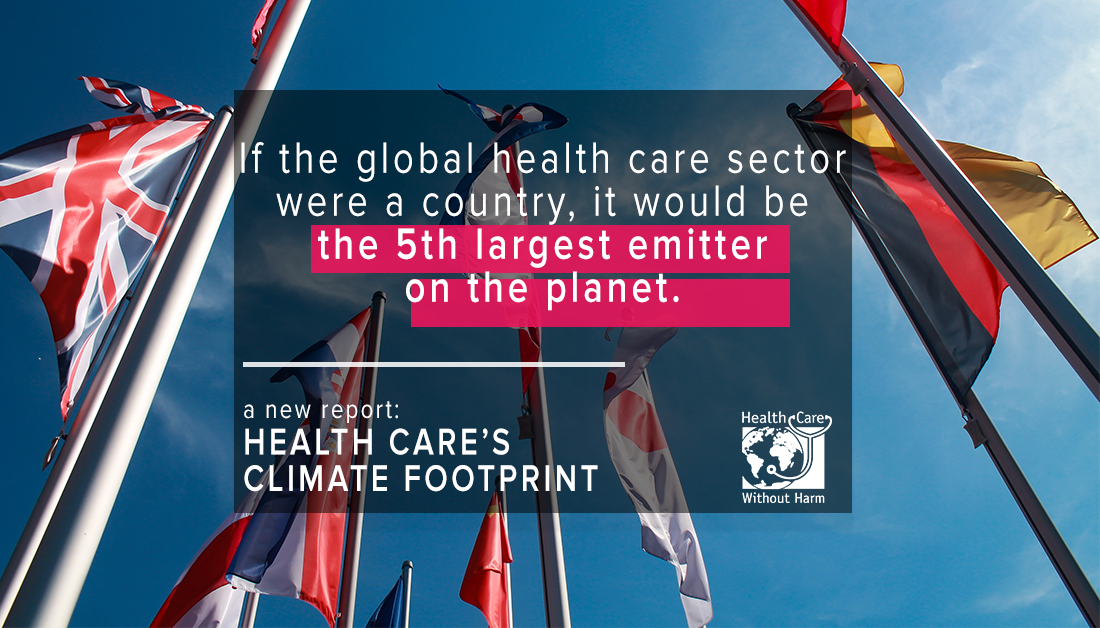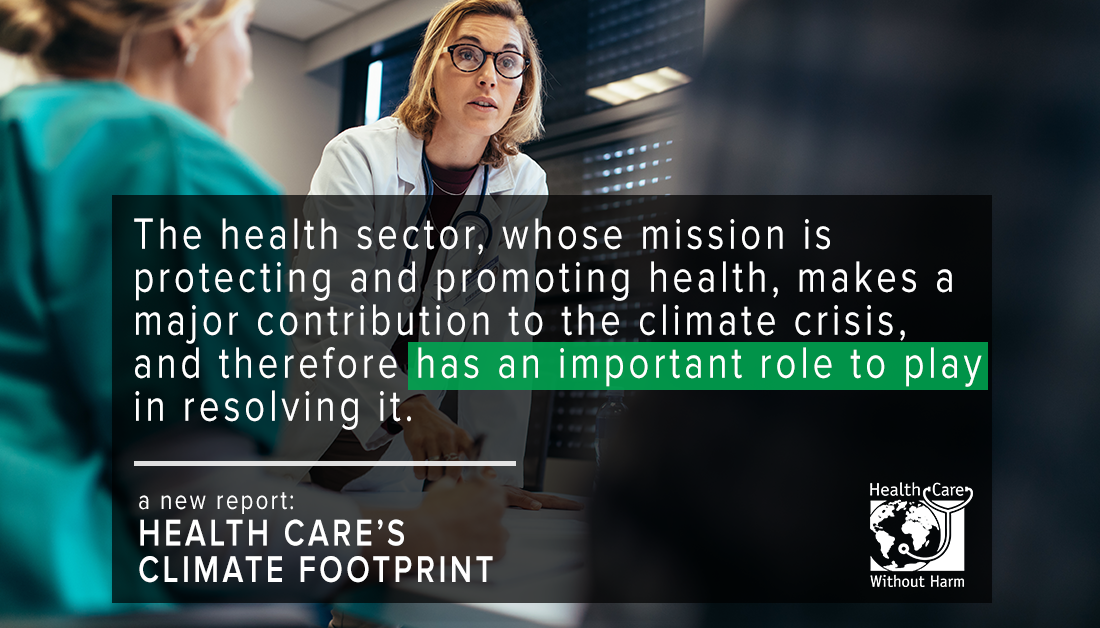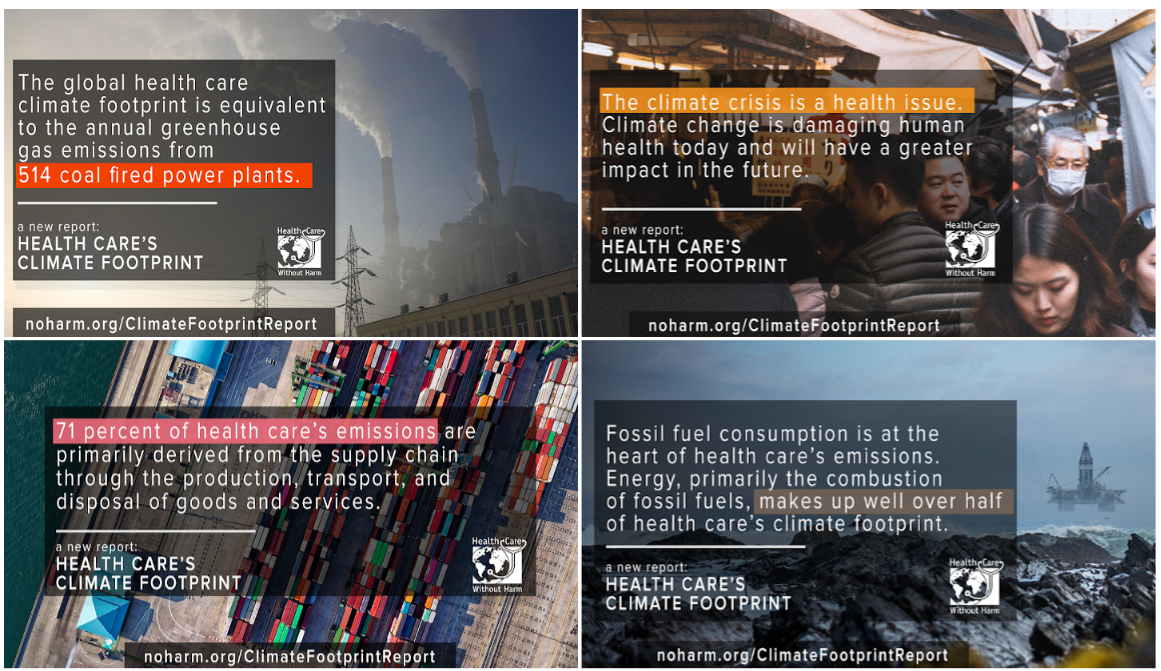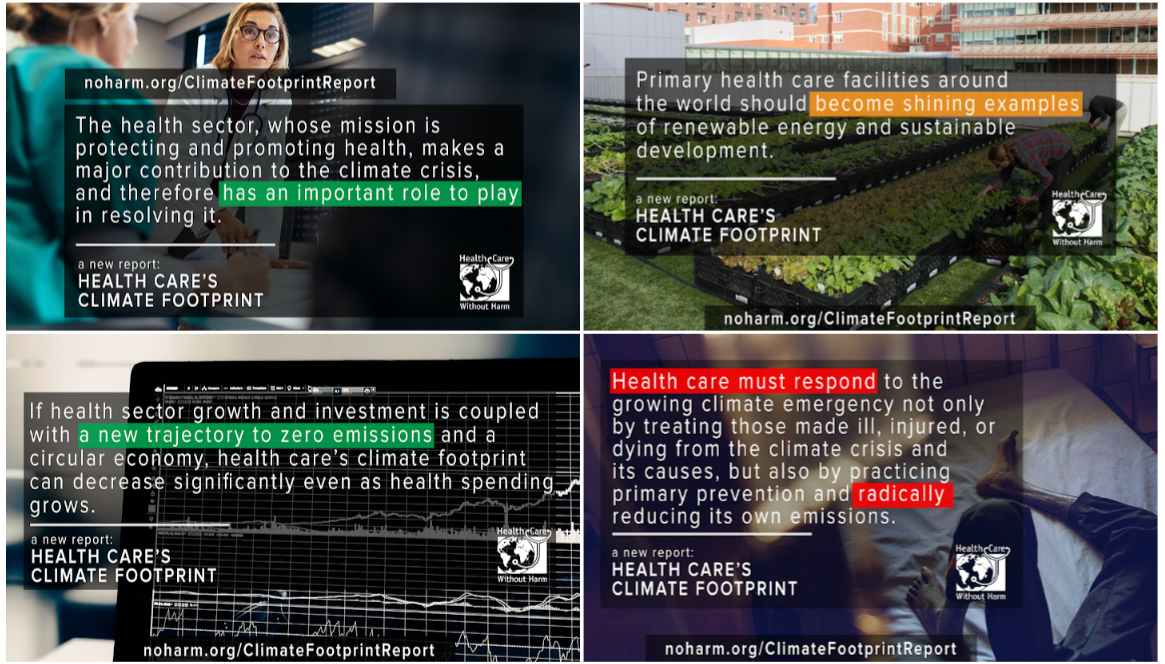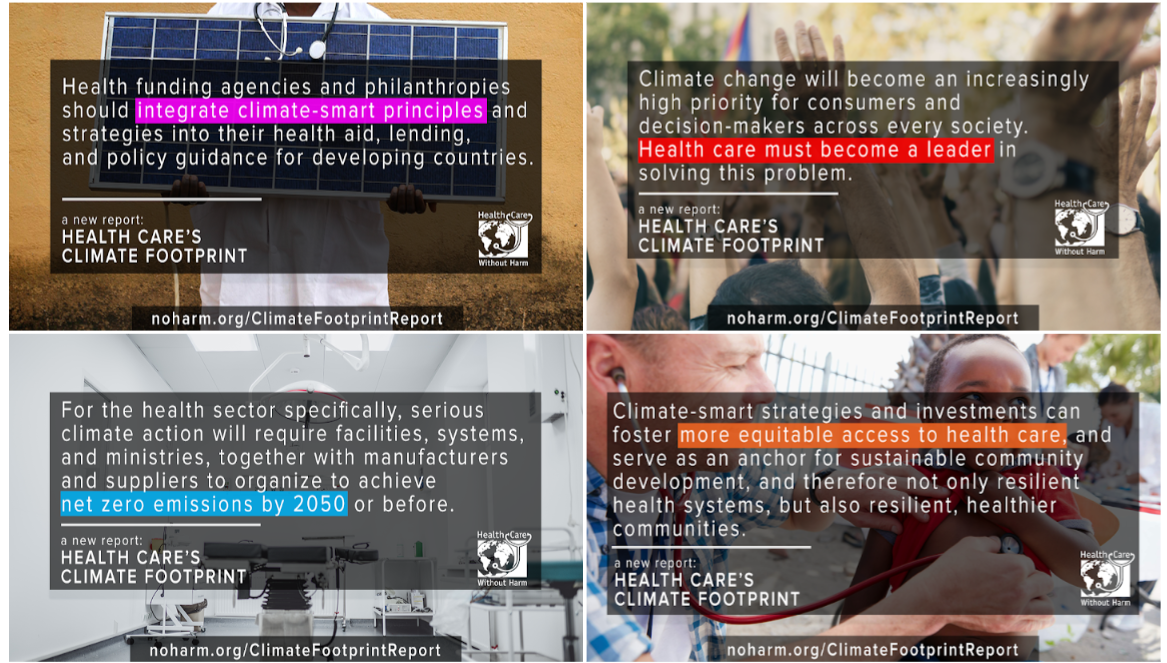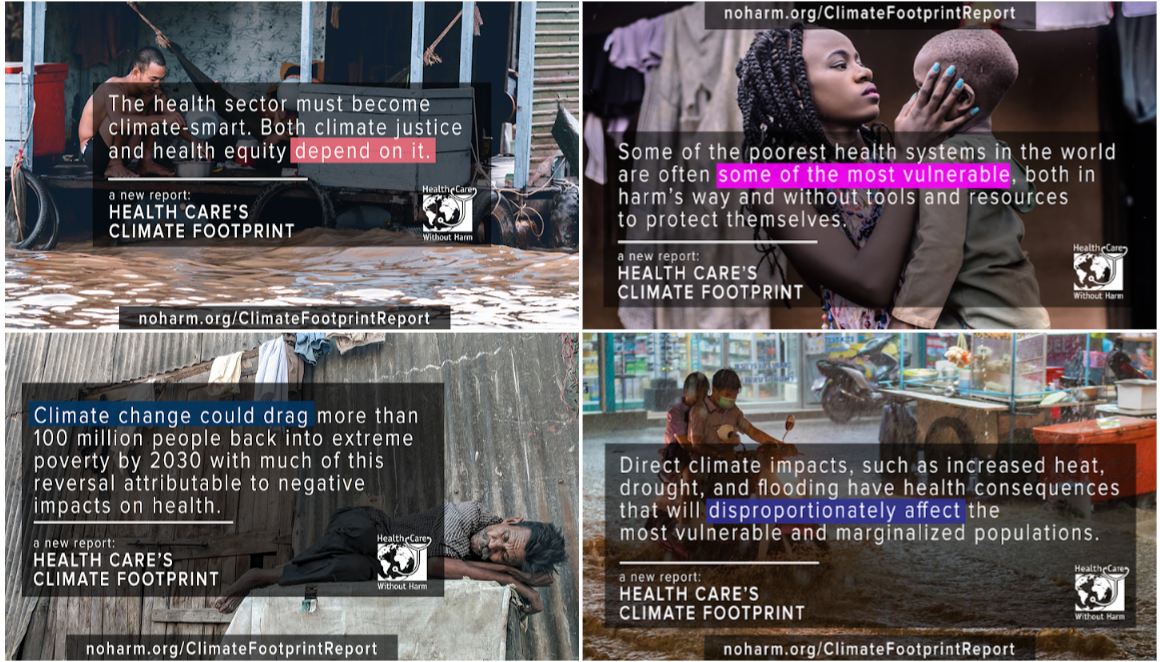Health Care’s Climate Footprint establishes the first-ever global estimate of health care’s climate footprint, identifies key sources of health care emissions, and makes a series of recommendations to align global health goals with global climate goals.
The health care sector is a major contributor to GHG emissions in the world and significantly contributes to the climate crisis - the greatest health threat of the 21st century. Therefore, it must play an important role in resolving it.
Your impact
As a key partner and friend in the climate and health sector, you can play an important role in amplifying the report’s findings and messages to drive the global conversation toward a healthier, more equitable future for all.
With the report covering a number of issues, we’ve created and categorized a variety of social media messages and images in the sections below that can be tailored to align with what’s most valuable to you and your audience.
These sample messages and images are free for you to download and distribute.
When crafting your own tweets, we encourage you to use the following popular hashtags in order to be a part of the larger conversation: #ClimateAction, #ClimateChange, #Health, #HealthCare, and #Emissions.
We also encourage you to tag key policymakers, journalists/media outlets, and health sector leaders when sharing the report.
And don't forget to tag @HCWHGlobal on Twitter and Facebook so we can amplify your messages as well!
Health care's climate footprint
Sample copy
NEW RELEASE: Read the report that establishes the first-ever robust estimate of health care’s global climate footprint. #healthcare #emissions #climateaction
Read: noharm.org/ClimateFootprintReport
The health sector, whose mission is protecting and promoting health, makes a major contribution to the climate crisis. A new report outlines actions #healthcare must start taking today to protect our health from future #climatechange impacts: noharm.org/ClimateFootprintReport
Fossil fuel combustion is at the heart of health care’s climate footprint. Energy — primarily the combustion of #fossilfuels — makes up well over half of the #healthcare climate footprint. Read the report: noharm.org/ClimateFootprintReport
If it fails to act decisively, health sector #emissions could grow to make up an even more significant portion of the global climate footprint. A new report outlines actions #healthcare must start taking today: noharm.org/ClimateFootprintReport
There is a strong correlation between a country’s health sector climate footprint and a country’s health spending. Generally, the higher the spending on #healthcare, the higher the per capita health care emissions are in that country: noharm.org/ClimateFootprintReport
Related images
Calls to action: Health care
Sample copy
If #healthcare growth & investment can align with global climate goals, the 10% of the world economy that health care represents can provide leadership for a low-carbon, more equitable, & healthier future. Read the report: noharm.org/ClimateFootprintReport
#Hospitals & health workers are first responders to the health effects of #climatechange. Hospitals and health systems will bear high costs resulting from the growing number of extreme climate events and must become resilient. Read the report: noharm.org/ClimateFootprintReport
Transitioning from fossil fuels to clean, renewable energy would reduce the burden of disease from both #airpollution and #climatechange. Read the new report: noharm.org/ClimateFootprintReport
Given the globalized nature of the health sector, a global road map can help chart a course to ameliorate its climate impact and move #healthcare toward zero #emissions by 2050. Read the report: noharm.org/ClimateFootprintReport
Those most responsible for contributing to the problem should take the most rapid action. Read the new report: noharm.org/ClimateFootprintReport
The #health sector goals of health promotion, disease prevention, universal health coverage, and the global #climate goal of net zero emissions must become intertwined: noharm.org/ClimateFootprintReport
The preventative #climateaction outlined in this new report will save millions of lives, significantly reduce climate emissions, and reduce #healthcare costs: noharm.org/ClimateFootprintReport
Related images
Calls to action: Cross-sector collaboration
Sample copy
A standardized framework should be designed to allow all governments to measure their health sector’s footprint and track their progress toward #decarbonization and resilience. Read the new report: noharm.org/ClimateFootprintReport
Every nation and segment of the #health sector must do its part. Read the new report: noharm.org/ClimateFootprintReport
It is essential that all health systems, together with the private sector, development agencies, multilateral funders, international organizations, and civil society, take concerted action to put #healthcare on a trajectory to zero emissions: noharm.org/ClimateFootprintReport
Health ministries, hospitals, and #healthcare systems should set and implement criteria for low-carbon or zero-emissions procurement so as to begin to decarbonize the supply chain: noharm.org/ClimateFootprintReport
A new report calls for government action plans to be established for climate-smart #healthcare. And the countries most responsible for the problem should lead the way: noharm.org/ClimateFootprintReport
Health investment and policy must be retooled for #decarbonization. If the health sector - health facilities & systems, ministries of health, international & bilateral development agencies, and private healthcare orgs — all take action, it can be achieved: noharm.org/ClimateFootprintReport
Related images
Climate and health equity
Sample copy
The #healthcare sector must become climate-smart while addressing its own inequities. Read the new report: noharm.org/ClimateFootprintReport
Low- and middle-income countries will see the worst effects of #climatechange as they are most vulnerable to climate shifts and least able to adapt given weak health systems and poor infrastructure: noharm.org/ClimateFootprintReport
#Airpollution makes a major contribution to chronic diseases that require treatment & hospitalization. This is linked to #inequity as more than 80% of premature deaths attributed to non-communicable diseases occur in low- and middle-income countries: noharm.org/ClimateFootprintReport
Direct climate impacts and the mass migration of climate #refugees have #health consequences that will disproportionately affect the most vulnerable and marginalized populations and increase in intensity over time: noharm.org/ClimateFootprintReport
In energy-poor settings, powering #healthcare with low-carbon solutions can enhance access to care, contributing to the advancement of universal health care for the poor and most vulnerable: noharm.org/ClimateFootprintReport
Related images
Thank you for being such an important partner in the climate and health movement. If you have any ideas or feedback on amplifying these messages through social media, please don't hesitate to contact us.
Be sure to follow us on Facebook and Twitter for all the latest news and updates in health care sustainability.
